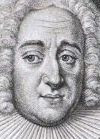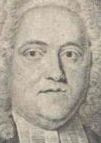This continues from Part 6 (Table of Contents in Part 1), an 8-part series presenting an English translation of J. C. W. Lindemann's 1873 article "Copernicus and the Lutheran theologians." — Lindemann finishes his "List" with a flourish, a rapid fire, of names. As long as the "List" is, we may add the name that C.F.W. Walther spoke of in 1868 – Carl Gottlob Hofmann. We may also add two more notable names that Pastor F.E. Pasche included: Abraham Calov († 1686) and Valentin Ernst Löscher († 1749).
- - - - - - - - - - - - - - - - - - - - - - - - - - -
Excerpt from Evangelisch-Lutherisches Schulblatt, vol. 8 (1873) pp. 65-74, 107-116; translation by BackToLuther; all highlighting, red text in [] square brackets, images, and hyperlinks are mine, underlining in original.
Copernicus and the Lutheran theologians.
[by J. C. W. Lindemann, Part 7 of 8, pp. 112-114]

Dr. Michael Christian Rusmeyer, professor of theology at Greifswald and pastor at St. Marien there, writes in his Historical Foundations of Knowledge of the Truth to Godliness (Hamburg, 1724), p. 344, from Joshua’s struggle against the Canaanites:
“In this battle God fought more from Heaven than the Israelites on Earth. For God caused a great hail to rain on the enemies and killed them. But Joshua became so joyful in God that, out of desire to chasten his enemies, he ordered the Sun and the Moon to stand still in the heavens. But God was so pleased with the boldness of this mighty man who fought in the faith, that he had no hesitation, according to the will of a man, to hinder the whole course of heavens, and to set the Sun and the Moon exactly in the place where Joshua had commanded them to stand still. Joshua 10:1-21.”

Johann Jacob Schmidt, pastor of Peest and Palow in Pomerania, author of Biblical History and similar writings, says in his Biblical Naturalist [Physicus] (2nd ed., Leipzig 1748, Preface p. 7): That one would well depart from the view of Scripture
“if the Copernicans, in the well-known dispute about the standstill of the Sun and the rotation of the Earth, instead of probabilities, as they have hitherto used them, were to put forward quite clear and irrefutable reasons for proving their system, and of the same (which is not believed to have happened yet) could dispense with all doubts and thus show that such is necessarily the only true thing.” [Rambach may allow a crack in the fortress with this?]
 |
| Geier — Carpzov — Hollmann (Siegesbeck not pictured) |
One of the Lutheran theologians who rejects Copernicus’s view is [Martin] Geier, who in his Commentary on the Psalms (1695) [1697 Google Books] speaks only of the doctrine of the Bible. Likewise, the famous Johann Gottlob Carpzov, who died in 1767 as superintendent in Lübeck, after having previously been professor of theology and the Hebrew language at Leipzig (Ramb. 309.). — L. [Johann Georg] Siegesbeck [scientist, naturalist] also wrote against the Copernican system. [1686-1755; 2 books here & here - online] — Sam. Christian Hollmann [philosopher, naturalist], died in 1787 as a professor of philosophy in Göttingen, published a treatise “On the obligation of a Christian astronomer for the Scriptures.”
Friedrich Eberhard Rambach [ADB bio] translated David Collier's Introduction to the Right Sense and Useful Reading of Scripture in 1759. In this book, under “History of the Jews under Joshua” (American Edition 1845, p. 176) it reads:
“Finally we notice that at the command of Joshua [page 113] the Sun stood still, chapter 10, as at the later time the shadow on the sundial of Ahaz went down ten degrees, 2 Kings. 20:11, and that therefore the whole arrangement of the heavens was changed, which is indeed very miraculous and must be taken as such. But we must doubt just as little that He Who made heaven could change the position of it and put it in order again, as that One who makes a clock should not be able to disorder its movement and also put it in order again. Presumably this happened in such a way that the night became so much shorter as the day became longer. So we do not need to agree with some people, both Jews and Christians, that God has either placed an extraordinary body of light like the Sun in the sky, or that He stopped the light of it merely by reflecting it back. The prophet Habakkuk 3:11 [Luther’s Bible Hab. 4:11] presents it as it really happened.”
Since Rambach translates these words without any further remark, it can certainly be assumed that he agreed with Collier.
Upon closer and more careful research, it would undoubtedly emerge that the most competent teachers of the faithful Lutheran Church down to our times have decisively rejected the Copernican system because it argues against experience and against the Bible without being able to give any solid reason for its own protection. In Germany this group includes for example Licentiate Ströbel. But here in America, too, there are not a few Lutheran pastors who would rather stick to God's Word than accept an unfounded human opinion.
But even among those Lutherans who do not take the faithfulness to the Confession of the church very seriously, there are men who spurn the “scholars” to make an assertion that violates the Bible as much as it is against common sense. It is worth remembering Pastor [Gustav] Knak in Berlin, who is grossly wronged even by Christians because he can not agree with modern science.
 |
| N.S.F. Grundtvig Danish theologian |
Similar to Knak was the recently deceased N. Fr. S. Grundtvig [LuW10 1864 essay here], who caused a sensation as a pastor in Copenhagen at the time. He was just as keen a theologian [But see note below] as a thorough historian. In his World Chronicle (literally translated by Dr. Volkmann, 1837) [not online] he speaks (p. 139) of our matter as follows:
“Tycho knew the Copernican riddle and rejected it, but certainly not from religious concerns.”
And he adds in Note 22 (at the back):
“How great Tycho's knowledge of the course of the heavens was, that will probably have to be taught in the time to come; for his master has not yet appeared, and that his students [i.e. Kepler!] commanded, according to their heads, the Sun to stand still and the earth to run eastward and westward [i.e. Copernicanism], [page 114] shows where their minds are, but by no means where he had his. But he showed this himself through the artificial celestial sphere that he made, and if it had not been robbed by the flames in 1728 (in the great fire of Copenhagen), it would probably have cost the astronomers of the 18th century enough headaches not only to understand it, but also to produce a counterpart that depicted the course of the Earth in their brains. It would certainly be easier for an astronomer to assemble a picture from Tycho's writings and have it executed by the artists of our day; a work that would perhaps promote science more than all the observations and calculations based on the prejudice that the Copernican hypothesis (which Brahe knew well and rejected, certainly not out of religious hesitation) was infallible because it contradicts the words of the Bible, the healthy sense and the straight eye.”
= = = = = = = = = continued in Part 8 = = = = = = = = = =Kepler – “less than ethical”?
Although Grundtvig does not mention Kepler by name, he is clearly referred to when G. speaks of Tycho Brahe's “students” that “commanded… the Sun to stand still”. This seems meant to criticize Kepler for where his "mind" was. Although Wikipedia does not mention it, even Space.com admits to Kepler’s unethical methods (here, 🔗): “…Brahe's observations, Kepler, by his own admission, less-than-ethically acquired them after Tycho died.” — It is too bad that neither source mentions that Kepler was also expelled from Graz (Austria) by the Romanists for his Protestant faith. (Text of Kepler's letter to Maestlin)
Grundtvig – questionable motive
Grundtvig, a famous Danish theologian, is surprising in his defense against Copernicanism because he held a low view of Holy Scripture. Lindemann seems unaware of this even though in 1864 Lehre und Wehre republished an article on Grundtvig from Germany that exposed his theology, describing it thus, p. 144:
"The Word of the Scriptures, fixed in the letter, is in itself dead and cannot create life for itself… The Reformers were wrong to base the faith of the Church on the Bible alone; they thereby established a new papacy."
Grundtvig's theology does not fit with the other theologians quoted in Lindemann's essay, but it does fit today's teachers of the LC-MS. —
| Tycho Brahe |
"According to Tycho, the idea of a rotating and revolving Earth would be 'in violation not only of all physical truth but also of the authority of Holy Scripture, which ought to be paramount.'"
More on Tycho's Christian faith here (p. 110-111), and here. — In the concluding Part 8 we hear of how the defense of the Bible weakened through the centuries.




No comments:
Post a Comment
Comments only accepted when directly related to the post.